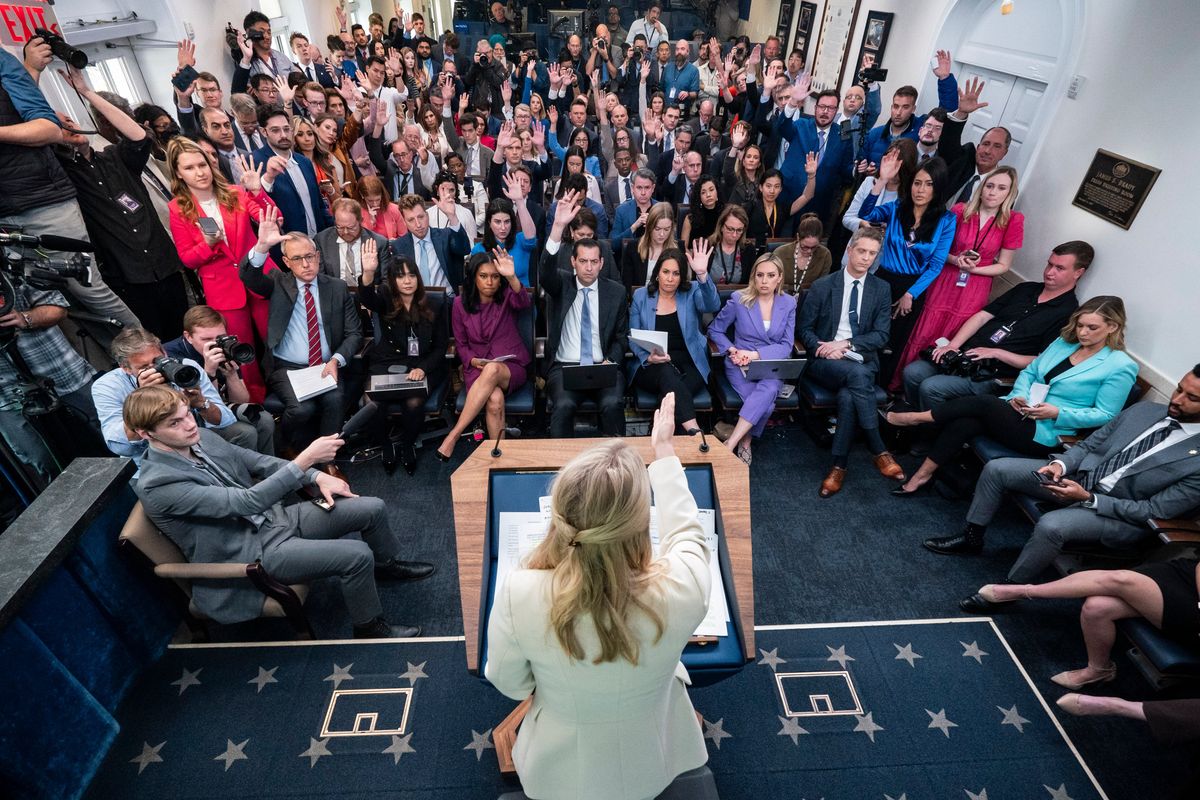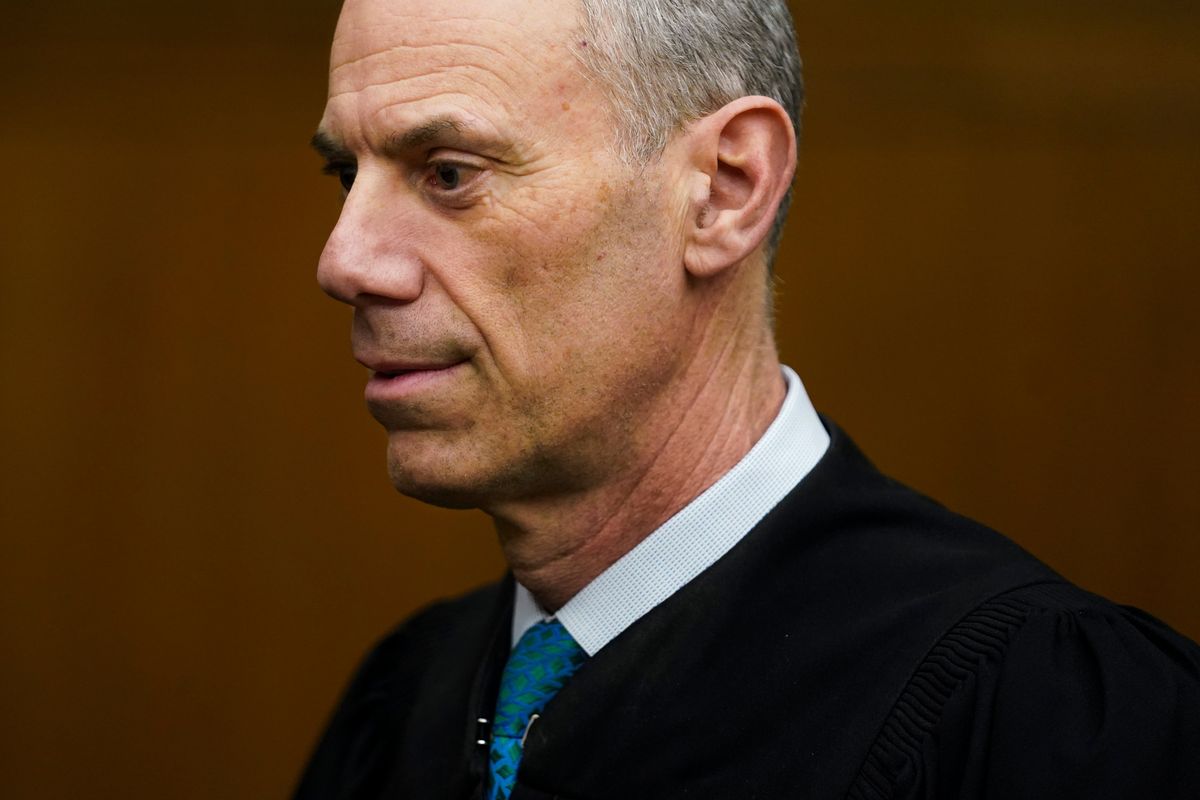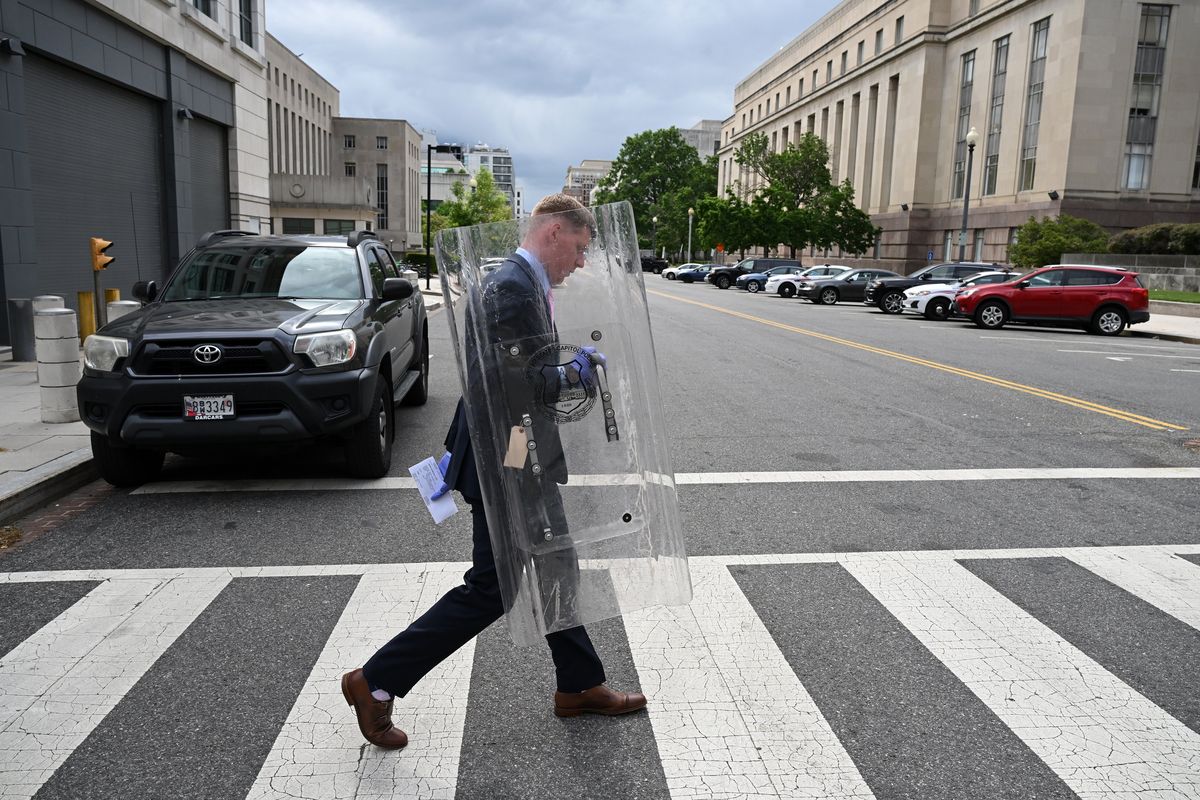Amid attacks, Judge Boasberg weighs holding Trump officials in contempt
Judge James E. Boasberg, chief judge of the Federal District Court in Washington, D.C. (Carolyn Van Houten/The Washington Post)
During President Donald Trump’s first weeks back in office, Judge James E. Boasberg watched the president and his allies attack other federal judges for halting some of the administration’s most far-reaching initiatives.
His turn came on a Saturday in mid-March.
At an emergency hearing, Boasberg temporarily blocked the administration from deporting alleged gang members to El Salvador without due process. Trump and his allies soon began calling for the judge’s impeachment. Online influencers, Republican lawmakers and the White House spokeswoman joined the attacks, drawing warnings from constitutional scholars about the need to respect the independence of the legal system.
Boasberg’s next decision may be one of his most fraught: whether to begin proceedings to potentially hold Trump officials in contempt for defying one of his orders in the deportation case.
It will be a pivotal moment for the longtime jurist – and the courthouse where he is now the chief judge. Both are venerable institutions in the nation’s capital that have played central roles in national security and presidential scandals for decades. Boasberg, 62, has a history of bipartisan support and friendships across the ideological spectrum, including with Supreme Court Justice Brett M. Kavanaugh, a Trump nominee who was Boasberg’s housemate at Yale Law School.
In court Thursday, the judge grilled a Justice Department lawyer for answers, his eyebrows raised and eyes wide as he suggested government officials had acted in “bad faith” and intentionally rushed to load migrants onto planes and out of the country before he could order them to stop.
“You’re telling me, you had no knowledge whatsoever that the planes were in the air or shortly would be in the air,” Boasberg said.
He pledged to “get to the bottom” of the matter and to issue a ruling next week.
A high-stakes courthouse
The E. Barrett Prettyman Federal Courthouse sits at the corner of Constitution and Pennsylvania Avenues, with views of the U.S. Capitol. The judges who preside there are accustomed to handling politically charged legal disputes and understand that public and media attention is part of the job.
The fallout from the Nixon-era Watergate scandal played out in these courtrooms, as did the frenzy over the investigation into President Bill Clinton’s relationship with a White House intern. In the past four years, the courthouse was inundated with cases involving the nearly 1,600 people charged in the Jan. 6, 2021, attack on the U.S. Capitol and consumed by Trump’s indictment for allegedly trying to obstruct the results of the 2020 election.
Trump’s re-election upended his criminal trial. As president, he swiftly unwound the Jan. 6 prosecutions, issuing a blanket pardon to nearly all Capitol riot defendants.
Now, the courthouse is at the epicenter of litigation challenging Trump’s aggressive moves to dismantle government agencies, fire independent agency leaders, target law firms and halt federal spending. Of the more than 160 lawsuits against the administration, about half have been filed in D.C., according to a Washington Post analysis of data from the online law journal JustSecurity and the legal research website CourtListener.
Across the country, nearly 60 judges or appeals courts have temporarily blocked Trump initiatives.
Attacks on the judges ruling against the administration have grown increasingly intense, threatening and personal, with Republican lawmakers blasting Boasberg and others at a hearing Tuesday as impediments to democracy. The president also took to social media to call Boasberg a “Radical Left Lunatic of a Judge, a troublemaker and agitator.” His demand to impeach Boasberg drew a rare rebuke from Chief Justice John G. Roberts Jr.
Boasberg and at least one other judge now have additional security protection because of the threats, said two people familiar with the matter, both of whom spoke on the condition of anonymity to discuss security issues.
While Trump and his allies may consider Boasberg a useful political target, they have picked a fight with an experienced judge who operates with a confidence that stems from his days as a college basketball player and a lifetime of achievement in elite institutions.
“This is one of the most highly respected federal judges in the country,” said retired judge David Tatel, who reviewed Boasberg’s work from his perch on the U.S. Court of Appeals for the D.C. Circuit and has often hired Boasberg’s law clerks. “Some people might say some of his opinions are liberal and some conservative, but they are all a faithful application of law and fact. He’s just superb.”
“Far from him being a darling of the left, he has been scrupulously independent,” Georgetown law professor Laura K. Donohue, an expert on constitutional and national security law, said of Boasberg’s separate work as a member of the U.S. Foreign Intelligence Surveillance Court, the country’s most security-sensitive court.
Colleagues inside the federal courthouse have rallied around their chief judge and each other. In addition to Boasberg, Republican lawmakers have called for removing three other judges on the D.C. bench. The Justice Department has separately tried to have Boasberg and Judge Beryl Howell removed from cases because of their rulings against the administration.
In hallway conversations, cafeteria encounters, and lunches in the judges’ wood-paneled private dining room, the atmosphere is a mixture of dark humor, resolve and sadness, particularly about the attacks on judicial independence and the rule of law, according to multiple people close to the judges who like others interviewed spoke on the condition of anonymity to discuss private conversations.
Many of the judges welcomed the pushback to Trump’s impeachment calls from Roberts, as well as similar statements from some conservative judges and Senate Republicans.
“People are in good spirits. We’re doing what we do. It’s our job,” one judge said.
Nominated by both parties
Boasberg, who goes by Jeb, was nominated by President George W. Bush to serve on the D.C. Superior Court in 2002. President Barack Obama tapped him for U.S. District Court in 2011, and he was confirmed by the Senate in a 96-0 vote.
Roberts named Boasberg to the intelligence surveillance court three years later, and elevated him to presiding judge in 2020. When that term expired, the chief justice put Boasberg on the United States Alien Terrorist Removal Court, where he served until this year.
Boasberg oversaw the surveillance court at a tumultuous time, following revelations of shortcomings in the FBI’s requests to wiretap Carter Page, a Trump adviser, as part of the investigation into Russian interference in the 2016 election. The judge came down hard on the FBI, barring certain officials from future national-security wiretap applications and establishing more-stringent notification requirements.
His rulings over more than two decades make him difficult to pigeonhole. In 2012, Boasberg ruled that the public did not have a right to view classified photos taken of al-Qaeda leader Osama bin Laden after he was killed by U.S. commandos in a raid on his compound in May 2011.
At the height of Hillary Clinton’s campaign against Donald Trump in 2016, Boasberg ordered the release of nearly 15,000 of Clinton’s emails from her time as secretary of state after the FBI turned them over to the State Department as potentially work-related.
The following year, Boasberg dismissed a lawsuit from a private watchdog group seeking the release of Trump’s personal tax returns since 2010, upholding the confidentiality of personal tax returns unless they were allowed by Trump himself or Congress’s joint committee on taxation.
In Capitol riot cases, Boasberg sentenced roughly 70 defendants and went below prosecutor’s recommendations about 94% of the time, a slightly greater rate than the court overall.
Boasberg was out of town the morning of March 15 when he was assigned his first Trump administration lawsuit, challenging the unprecedented decision to use the wartime Alien Enemies Act to deport alleged gang members without the customary immigration proceedings.
He quickly scheduled a hearing via Zoom, apologizing for appearing in a blue sweater instead of a black judge’s robe. Boasberg blocked Trump officials from using the act to deport Venezuelans and ordered the administration to immediately return to the United States any planes already in flight.
In a subsequent hearing, the judge demanded that the government explain why it had nevertheless deported more than 130 Venezuelans to a prison in El Salvador that day. He sounded incredulous when a Justice Department lawyer said the planes were already out of U.S. airspace and asserted that the judge’s verbal order to turn the planes around would only have had force if he put it in writing.
“A heck of a stretch,” Boasberg said.
At a tense hearing Thursday to determine whether to open contempt proceedings against Trump officials, Boasberg calmly pressed the government’s lawyer, who repeatedly struggled to respond, saying he did not have the information the judge was seeking.
“Who made the decision either not to tell the pilots anything or to tell them to keep going?” the judge asked.
“Your honor, I don’t know that,” Deputy Assistant Attorney General Drew Ensign said.
“You’re standing here telling me you have no idea who made the decision not to bring the planes back,” Boasberg said, shaking his head from a high-backed black chair beneath a large U.S. District Court seal.
Personal attacks
Two days after Boasberg issued his first order blocking the deportations, far-right influencer Laura Loomer began attacking his family.
“I have exclusively uncovered a massive CONFLICT OF INTEREST involving Judge James Boasberg,” Loomer wrote on X, naming one of Boasberg’s daughters, sharing her photo and alleging that her work for the social services nonprofit Partners for Justice rendered Boasberg’s family “a national security threat.” The post was seen over 9 million times and shared 29,000 times.
Dozens of prominent right-wing influencers began posting about Boasberg’s daughter, some calling for her employer to be stripped of its 501©3 status.
Soon, other accounts targeted Boasberg’s sister and brother-in-law. By March 27, Trump was referring to Boasberg’s “disqualifying family conflicts” in late-night rants on Truth Social.
White House spokeswoman Karoline Leavitt labeled Boasberg a “Democrat activist” because of his wife, who has donated about $10,000 to Democratic candidates or groups over 17 years, and helped found an abortion clinic in Northern Virginia – activity also seized on by conservative media.
Trump’s attacks intensified when Boasberg landed a second case explosive case, involving the use of the messaging app Signal by Trump’s top national security officials to discuss a military operation Yemen.
The judge ordered Trump’s advisers to preserve records from the discussion.
That prompted Trump to suggest the system was rigged and that Boasberg was “grabbing the ‘Trump Cases’ all to himself.”
Boasberg seemed to respond in a subsequent hearing, explaining that cases are parceled out randomly to ensure even distribution among judges.
“That’s how it works, and that’s how all cases have continued to be assigned in this court,” the judge said.
Steve Hartmann, who lived with Boasberg during law school, said the judge is the ideal person to be handling the cases involving the Trump administration because of his experience, measured temperament and intelligence.
“He’s been doing this a long time, and he knows it’s not about him,” Hartmann said. He has “a long wheelbase – little bumps in the road aren’t going to affect him so much because he has a very stable platform that he sees the world from.”
Boasberg grew up in Washington, the son of two prominent civic leaders. At 6-foot-6, he played basketball for St. Albans School and Yale University, where he graduated with undergraduate and law degrees. He earned a master’s degree in history from the University of Oxford.
The judge’s friends and colleagues describe him as an extrovert and organizer, who plans outings to Frank Pepe’s Pizzeria and hosts parties in his Northwest Washington neighborhood, where his neighbors until recently included Supreme Court Justice Ketanji Brown Jackson.
A book party that Boasberg held last year for Tatel at his home drew another member of the high court, Justice Sonia Sotomayor.
Before his ascension to the bench, Boasberg was a prosecutor in D.C., known for drawing the toughest cases and never losing a trial.
In that role, he often took positions at odds with attorneys supervised by A.J. Kramer, the longtime head of the federal public defenders office. Boasberg was honest, fair and reasonable, Kramer said, but “not in any sense a pushover at all.”
Of the recent characterizations of the judge as a radical liberal, Kramer said, “He definitely does not fit that description.”
Hartmann agreed: “I just don’t think it will stick. It’s hard to paint Jeb Boasberg as a crazy, radical leftist. He’s an institutionalist kind of guy.”
Even as Boasberg has sharply questioned the administration’s compliance with his deportation order over the last few weeks, he has been slow to reach a conclusion about formally sanctioning government officials.
That decision, he made clear on Thursday, should come next week.
“Jeb will gather the facts and make a decision and move on to the next one. He’s not a guy who is going to wring his hands over the issues before him,” said Hartmann, who remains close to Boasberg and attends annual gatherings of their law school housemates – a group that includes Kavanaugh.
“A lesser person could get so irritated and unhappy with the administration that they would do more in terms of sanctioning the government,” Hartman said.
“Jeb understands, I think, that this is an important case not only for these individual plaintiffs but also for the signals it sends to judges on his court, judges on other courts and lawyers and we the public.”



